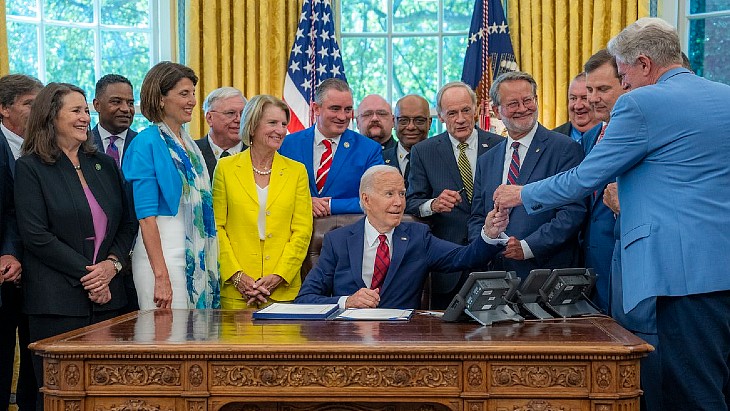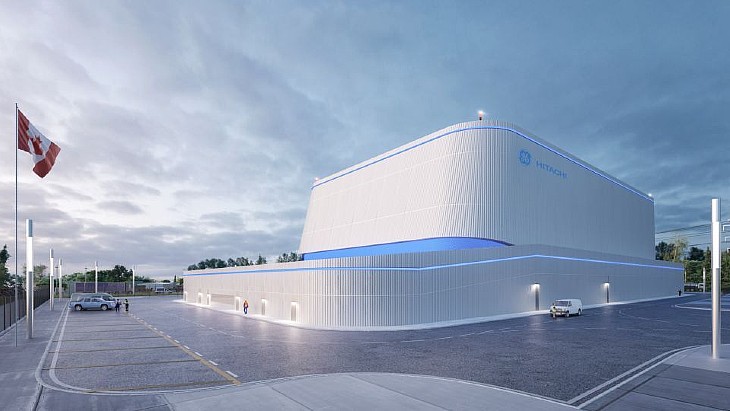Four US companies chosen for Mo-99 production funding
.jpg)
Mo-99 is used in hospitals to produce the technetium-99m employed in around 80% of nuclear imaging procedures. Produced in research reactors, Mo-99 has a half-life of only 66 hours and cannot be stockpiled, and security of supply is a key concern. Most of the world's supply currently comes from just four reactors in Belgium, the Netherlands, Russia and South Africa, and recent years have illustrated how unexpected shutdowns at any of those reactors can quickly lead to shortages. Furthermore, most Mo-99 is currently produced from HEU targets, which are seen as a potential nuclear proliferation risk.
The isotope technetium-99m (which is the daughter isotope of Mo-99) is used in over 40,000 procedures in the USA per day. However, for 30 years prior to 2018, the USA has not produced Mo-99 and currently imports much of its requirements. Since 2009, the NNSA has been working with commercial partners to accelerate the establishment of a domestic Mo-99 supply network. In 2018, one of those partners, NorthStar Medical Radioisotopes, received Food & Drug Administration (FDA) approval for manufacture of its domestic, non-uranium Mo-99, the RadioGenix System (technetium 99m generator) and Tc 99m produced by the RadioGenix System. With its partner MURR, NorthStar is the first domestic producer of Mo-99. Since FDA approval, NorthStar has started to supply customers, becoming the first US producer of Mo-99 in more than 30 years, as well as offering a novel new approach to the generation of Tc-99m.
Last year, NNSA issued a new funding opportunity announcement for the production of Mo-99 without the use of HEU.
Yesterday, the Department of Energy (DOE) announced the NNSA had completed its assessment of applications submitted in response to the funding opportunity. Based on its evaluations and recommendations of an independent technical review panel, four companies have been selected to hold negotiations with for potential new cooperative agreement awards. The companies are: Niowave Inc, NorthStar Medical Radioisotopes LLC, Northwest Medical Isotopes (NWMI) and Shine Medical Isotopes.
Lansing, Michigan based Niowave is developing superconducting electron linear accelerators for medical radioisotope production.
NorthStar - based in Beloit, Wisconsin - is developing two processes to produce Mo-99 without using HEU. In the short term, it is working to use the Missouri University Research Reactor (MURR) to irradiate Mo-98 targets to produce Mo-99, while in the longer term it is developing a method to produce the isotope using a linear accelerator.
NWMI has licensed technology from Oregon State University for new low-enriched uranium (LEU) targets for use in Triga research reactors. NWMI - based in Corvallis, Oregon - has already notified the US Nuclear Regulatory Commission of its intention to submit an application for a construction licence for a facility which would produce the targets, ship them to a network of university research reactors where they would be irradiated, and process the returned irradiated targets to recover the Mo-99.
Shine is constructing a facility in Janesville, Wisconsin, which will produce medically important isotopes, including Mo-99, using low-energy, accelerator-based neutron source to fission an LEU target dissolved in an aqueous solution. Commercial production of Mo-99 at the facility is scheduled to begin in 2021.
With support from Congress, DOE/NASA is appropriated to fund cooperative agreements up to USD15 million for each company. Industry partners will match any awarded funding amount.
"Mo-99 is such a critical toll in healthcare. Doctors count on it every day," said US Energy Secretary Rick Perry. "This industry outreach helps to develop a reliable domestic supply of a vital medical isotope, reduce dependence on foreign imports, and bring new opportunity to the heartland."
NNSA also funds National Laboratories to advance industry efforts to produce Mo-99 domestically without HEU. In 2019, NNSA is funding national lab work in support of NorthStar, Shine, NWMI, Niowave, as well as: BWXT Isotope Technology Group, COQUI Radio Pharmaceuticals, Global Medical Isotope Systems, and Magneto Inertial Fusion Technologies Inc.










_88592.jpg)

